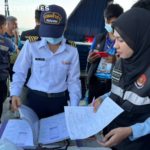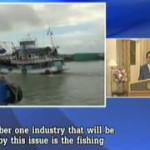
The European Union granted Thailand more time to end illegal, unreported and unregulated (IUU) fishing, but strongly urged Thailand to speed up reforms, while the Food and Agriculture Organization of the United Nations called Thailand’s efforts encouraging and offered to help the Kingdom and other nations in the region combat destructive fishing.
The European Union (EU) said in a statement released last week that a meeting would take place soon with Thai officials, which “will be a new opportunity for them to show their good will and commitment.” Thai Prime Minister Prayuth Chan-o-cha took steps recently indicating the government’s reforms of the fishing are proceeding with enough speed and vigor. In late April, he replaced the head of the Department of Fisheries in order to meet deadlines in implementing the government’s measures. Last week, the Prime Minister ordered a restructuring of the Command Center to Combat Illegal Fishing (CCCIF), the body supervising the efforts to clean up the sector. He shipped out the head of the Navy and installed the Minister of Agriculture as its new chief.
In April last year, the EU gave Thailand a “yellow card”, or warning, that its seafood products would be barred from Europe unless it cleaned up its act on IUU fishing. The EU is an important market for Thailand’s seafood industry, which has been estimated at $7.2 billion in value and is an important source of jobs and foreign exchange. The Kingdom’s fishing and seafood industries expanded rapidly over the past two decades.
The current government is trying to properly manage in an extremely short period of time. It responded to the EU’s warning by drafting a comprehensive set of measures to reform the sector, end IUU fishing and also the human trafficking that has been found in the industry. Measures include bans on destructive fishing gear, bans on entering protected areas, the beginnings of a catch traceability system, stepped up trainings of and inspections by oversight officers, port-in/port-out inspections, and the installation of vessel monitoring systems for all fishing ships 30 tons or larger.
More than 8,000 fishing vessels had their licenses revoked for not meeting the new regulations. Steve Trent, head of the Environmental Justice Foundation (EJF), while pointing out shortcomings, recently cited “positive changes” in senior Thai government officials’ approach to the problem, highlighting legal reforms and the vessel monitoring system, which he described as “among the best in the world.” He also noted recently that the EU’s own traceability system is not up to the task of preventing IUU fishing, while praising the EU’s overall efforts.
The Food and Agriculture Organization (FAO) of the United Nations also cited progress by Thailand in signing on to the Port State Measures Agreement. “We are very encouraged that so many countries in the Asia-Pacific region have signed up to this agreement, particularly some of the major exporters like Thailand,” said FAO assistant director-general and regional representative, Kundhavi Kadiresan.
He said the FAO was ready to work with Thailand and other countries in the region to improve and accelerate their responses to the problem of IUU fishing.
Thailand’s private sector has also been taking the initiative, with several major seafood firms moving operations in-house to ensure clean supply chains, and joining groups such as the Shrimp Sustainability Task Force, in which they work with retailers in the United States, the International Labor Organization, and civil society groups such as EJF, to devise and implement measures to eliminate IUU fishing, trafficking and other problems.




